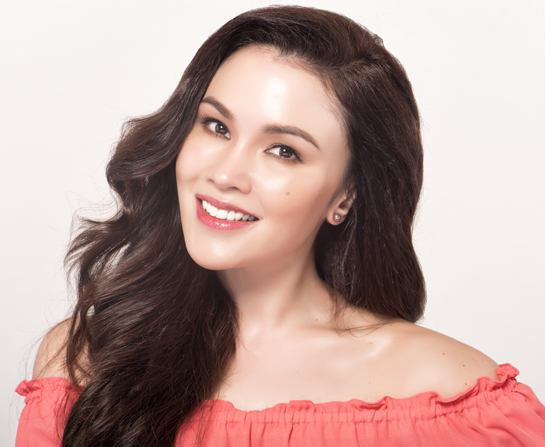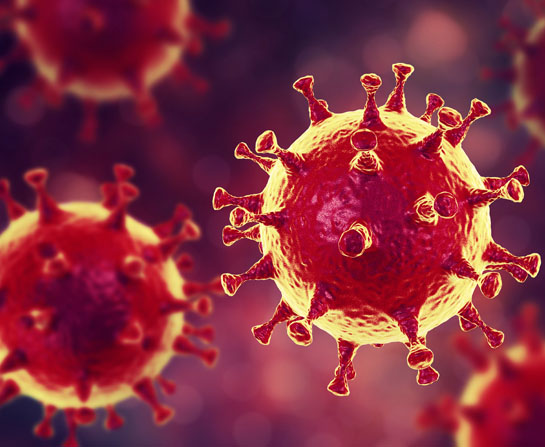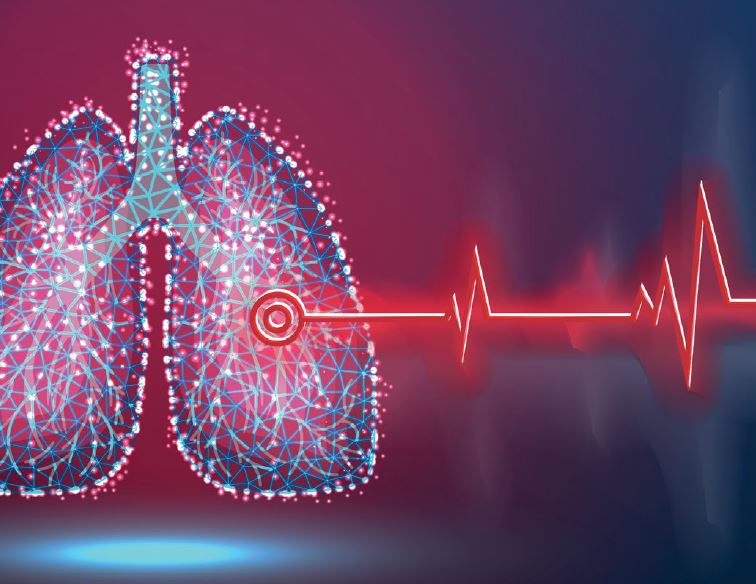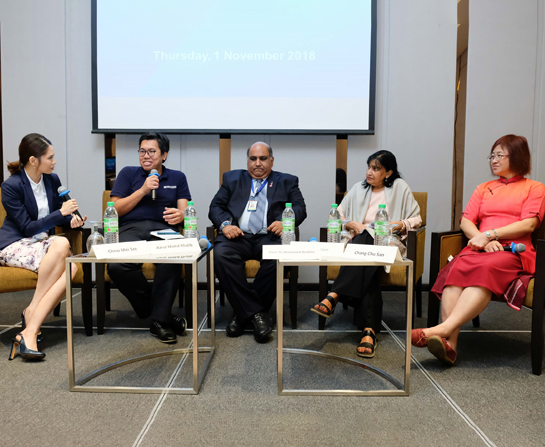WORDS HANNAH MAY-LEE WONG
As Malaysians, most of us recognize the gorgeously charismatic Che Puan Sarimah Ibrahim. We watched her on NTV7, Astro, TV3, we heard her on Red FM and Mix FM, some of us even had the chance of attending events where she was the emcee; it’s clear that this half-Irish Malaysian beauty has been around and is here to stay. But something about her has changed lately: she’s become a mother. In this intimate and exclusive interview, Sarimah chats with us about life, motherhood and how taking care of her mental health plays a big role in helping her stay grounded.
An Introduction: Che Puan Sarimah binti Ibrahim is a Malaysian-Irish television host, actress, singer and radio announcer. With more than 20 years’ experience, her career highlights include: being a host on the Disney channel, hosting The Biggest Loser Asia on Hallmark ,Akademi Fantasia and The Sarimah Show.
Staying true to herself, Che Puan Sarimah doesn’t sugar coat when sharing her experience of being a new mother. Unexpectedly, when asked if she’s always wanted to be a mother, the answer was: no. Sarimah reveals, “I’ve got three younger brothers. Mum didn’t have a helper or anything, so I was the second in charge. I fed them, changed nappies, did everything you had to do as a mother since young. I guess from that experience I felt like I’d already done the mothering role.”
“In my 20s and 30s, I didn’t think I wanted to be a mum. I care so much about my brothers, I see them like my own kids until today … But when I hit 35, I met my husband and that’s when things started to shift. I think when you meet the right person, it changes your perception about the future. It was delayed, but my maternal instincts only started kicking in then.” At the heart of it, Sarimah tells it like it is: Every mother’s journey is unique, and the process is never easy. She elaborates on the joys of motherhood, her struggles and finding herself again through it all.
AT THE BEGINNING
At 42 this year, Sarimah acknowledges that getting pregnant with baby Tunku Sofia Najihah was a miracle in itself. What may surprise some is that she did not even need the help of IVF (in vitro fertilization). “Just to clarify, I’m not against IVF at all. Everybody has their own way of doing things and IVF helps so many people,” Sarimah assures. “For me and my husband, the experience was just a little bit pushy. I was told: ‘You’re 40, your eggs are going to run out, you need to do this now!’ … I was also told that even though I was perfectly healthy, there’s no reason why I can’t get pregnant, but if I wanted to speed things up, then I should try IVF.”
After some deliberation, Sarimah paid a visit to her gynaecologist. A quick checkup was done, and her gynaecologist concluded that she was perfectly healthy and able to get pregnant naturally. He recommended a D&C (dilation and curettage) procedure for Sarimah. “They cleaned out my womb to make sure the conditions in my womb were suitable for implantation. A lot of women don’t realize they’ve got fibroids or other factors that hinders them from getting pregnant.”
A day after the procedure, Sarimah’s gynaecologist was very confident that she should have no trouble getting pregnant naturally. “Two months after that, it happened, I got pregnant,” Sarimah beamed with joy.
WORKING OUT THROUGH PREGNANCY
“In the beginning, I had morning, afternoon and night sickness (I don’t know why they call it morning sickness, it was all the time!). I felt quite sick for 7 weeks,” Sarimah said.
“I was little bit worried because I am quite a fitness fanatic. My gynaecologist kept telling me to slow down since this was my first precious baby. But I’ve been working out for 15 years with cardio and weights every day: pilates twice a week, having a personal trainer for weights once a week … I thought I would still do the same but perhaps just cut the intensity.”
Upon consulting her doctor, she was advised to stick to what she felt comfortable doing. “I tried to lie down and do nothing, but I felt sicker. When I went to the gym for workouts, I felt better. Everyone’s an individual and you can’t say what works for you works for everyone. For me, stopping exercise would have been worse.”
Sarimah worked with her doctor and trainer to come up with a suitable programme for pregnancy. “I didn’t do weight training until after 3 and a half months of pregnancy. For cardio, I also waited after my second month of pregnancy before I did anything past 15 minutes. By my eighth month, I slowed again to prevent back pains. But the day before I gave birth, I was still doing my cardio workouts, fast walking uphill!”
“During my pregnancy, I did light walks, squats, lunges, weights … My trainer adjusted my workouts. I also went for pregnancy group workouts where they have professional trainers for pregnant women,” Sarimah adds.
SPEAKING UP ABOUT POSTPARTUM DEPRESSION
When it comes to motherhood, out of “mom-guilt,” many choose to only talk about the positives of parenting. But having studied psychology in depth, Sarimah knows that this isn’t the healthiest way of going about it.
“For someone in my position, it could be seen as me being in the limelight, having help, having financial ease, what’s there to complain about? But it’s not about having 10 nannies or how much money you have in the bank.” Sarimah emphasizes that a mother’s journey has physical, spiritual and mental aspects to it—wellbeing in all those areas matter.
“I had slight postpartum depression. It’s common but no one really talks about it. A lot of people think that this is like a phantom condition that can be dismissed. People think it’s just because of the hormones, but it’s not.”
THE HIGHS AND LOWS OF MOTHERHOOD
In life, Sarimah strongly believes that for every high, there naturally will be a low. “A holistic way to look at what happens to you after you give birth, is that when you give birth, you get so excited. Your adrenaline is pumped up. Your expectations for yourself, your husband, your baby, and your life are so heightened that days after (mentally and physically), there will naturally be a drop. The shock and change to your system (not just your body, but your whole life system) can just hit you.”
“It was quite challenging in terms of my emotions. I couldn’t understand why all the tears were flowing. I didn’t know why I was going through the dips, I thought you should stay perpetually high like the day you gave birth … In that process, luckily I had my supportive husband and my close friends, and I got help—I went for therapy.”
GETTING THERAPY
Like so many women hit with postpartum depression, Sarimah inexplicably experienced waves of sadness, guilt, and confusion between the new-found happiness of being a new mom. “I knew I needed to ask for help. I didn’t know what was going on, why I was feeling like that. I was exercising, eating well, but I knew this up and down was a bit too much.”
“So, I got some therapy, and it helped. I talked it out, had my catharsis; then you find out you’re normal, then you feel safe. You find out other women are going through the same things and it takes away the shame and the taboo. I started feeling more myself.”
“If I hadn’t gone for that therapy, I think I would have still been in that foggy headspace between ‘what’s wrong with me’ or ‘I’m not good enough’ or ‘Oh my God, where is my future going to go?’”
Sarimah still continues to go to therapy to this day. “Therapy is like working out. You don’t just go, and then stop. For me, I go for my therapy every month just like I make sure I go to the gym. You can’t just take care of your body without taking care of your mind. It needs to be a holistic approach.”
IGNITING THE CONVERSATION
Sarimah voices her concern that people don’t talk enough about postpartum depression. “Nobody knows that suffering feeling when you don’t even know yourself after you give birth—your body and your mind has changed; your hormones have gone wonky, you’ve got all these questions like ‘Who am I? What am I doing?’”
She elaborates that the way postpartum depression presents itself to every mother is very different, and it stems from a cumulation of each individual’s history. “What you’ve been through, what you saw your mother go through, plus your own chemicals in your mind—there’s no way to prepare for it, it (postpartum depression) hits you in a way that’s customized to you.”
“The only thing you can do is: If you feel it’s too much, that’s when you should go talk to somebody. It’s just one hour of your life. Talking to a therapist can lead you to feel better or find out if you need further help.”
Mentally preparing for the future Sarimah is very much a career driven woman. Up until she had gotten married, she had 22 years’ experience being a host and public figure. She made a conscious decision to slow down after she tied the knot, but she reveals that there are many things up her sleeve at the moment. “Now that Sofia’s 6 months old, I’m looking more into how I can work in the mental health field. I want to help women, and it’s a journey. As I have helped myself, I’d like to help others.”
In closing, we also asked Sarimah what she’s looking forward to most in her life. She replied, “None of us know what the future holds. Every day I look forward to what Sofia would do and what her next words will be—those are my thrills nowadays. I look forward to finding more about myself, seeing who I am in this process and I still love entertaining people, so I don’t see myself saying good bye to that anytime soon, I’d love to combine mental health and entertainment somehow.”
To top it all off, Sarimah has her own cosmetic line named Thrill by Sarimah Ibrahim. “It’s health focused and uses natural ingredients. We sell our products (compact powders and cushion foundations) on Shopee and it’s doing quite well. That’s something I really enjoy doing. We have ingredients that help with acne and sensitive skin.”
While the multi-talented entertainer continues to work on many things that are currently in the pipeline, we wish her all the best in her future endeavours and hope to keep in touch. Speaking of exciting events, Sarimah and her husband, Tunku Nadzimuddin Tunku Mudzaffar will be at our Health in the City (HITC) Move Run 2020 event as guests of honour. Make sure to join our run to get a glimpse of the lovely couple.
Lastly, we would like to extend a special thank you, to Che Puan Sarimah Ibrahim and her husband for this interview, and graciously agreeing to be part of our event.









